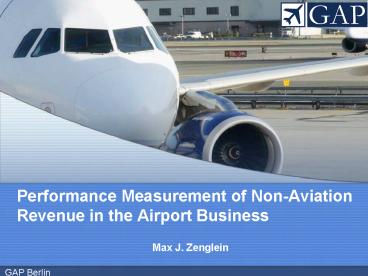Max J' Zenglein - PowerPoint PPT Presentation
1 / 13
Title:
Max J' Zenglein
Description:
The Issue and the Aim of the Paper. 2. Variations in the Definition of NA Revenue ... notably all commercial activity within the perimeters of the airport as well as ... – PowerPoint PPT presentation
Number of Views:115
Avg rating:3.0/5.0
Title: Max J' Zenglein
1
Performance Measurement of Non-Aviation Revenue
in the Airport Business
- Max J. Zenglein
2
Agenda
- The Issue and the Aim of the Paper
- 2. Variations in the Definition of NA Revenue
- 3. Problems of Data Availability
- 4. Performance Indicators
- 5. Key Suggestions
- 6. Our Definition of NA Revenue
- 7. Conclusion
3
1. The Issue and the Aim of the Paper
- The Issue
- Despite the importance of non-aviation
activities for the airport business, there is no
common definition in place - Problems of data availability contribute to the
difficulty of benchmarking non-aviation
performance - The Aim
- Provide an overview of current definitions
- Discuss performance indicators highlighting
problematic issues - In the near future use feedback to produce a
new approach and implement the key findings to
selected German airports
4
2. Variations in the Definition
- No formal definition of non-aviation is in place
- Much leeway in financial reporting
- Relatively unreliable data
- Exact composition of non-aviation figures often
not clear - Research delivers different results for the same
airports
5
2. Variations in the Definition
Overview of Various Non-Aviation Revenue Shares
to Total Revenue, 20031 Source Annual
reports 2003, ATRS 2005 and TRL 2005 1 The
2005 reports of TRL and ATRS base their analyses
on 2003 financial data, therefore the relevant
annual reports are considered.
Overview of Various Non-Aviation Revenue Shares
to Total Revenue, 20031 Source Annual
reports 2003, ATRS 2005 and TRL 2005 1 The
2005 reports of TRL and ATRS base their analyses
on 2003 financial data, therefore the relevant
annual reports are considered.
Overview of Various Non-Aviation Revenue Shares
to Total Revenue, 20031 Source Annual
reports 2003, ATRS 2005 and TRL 2005 1 The
2005 reports of TRL and ATRS base their analyses
on 2003 financial data, therefore the relevant
annual reports are considered.
Overview of Various Non-Aviation Revenue Shares
to Total Revenue, 20031 Source Annual
reports 2003, ATRS 2005 and TRL 2005 1 The
2005 reports of TRL and ATRS base their analyses
on 2003 financial data, therefore the relevant
annual reports are considered.
Overview of Various Non-Aviation Revenue Shares
to Total Revenue, 20031 Source Annual
reports 2003, ATRS 2005 and TRL 2005 1 The
2005 reports of TRL and ATRS base their analyses
on 2003 financial data, therefore the relevant
annual reports are considered.
6
2. Variations of the definition
- FraportRetail Real Estate Parking Others
- Berlin AirportsRents
- Dortmund AirportRents Advertisement Parking
Other - BoozAllenHamiltonRetail Conference Rooms
Parking - BCGRetailAdvertising Space
- ICAORestaurants Retail Parking Aviation
Fuel and Oil Concessions Any other Concession
or Commercial Activity, operated by the Airport
7
3. Problems of Data Availability
- Some airports provide disaggregated non-aviation
data, others provide only aggregated figures - More detailed breakdowns often lack n appropriate
definition of individual data description - Variations in ownership structures result in
different availability of detailed information - Consolidated financial reports of airport groups
make it difficult to compare it with other
individual airports - Reported data is not always consistent with
previous years
8
4. Performance Indicators
- 1. Revenue as of PAX or sqm
- Not all revenue originates from the passenger
- Revenue could originate from employees, visitors
and local residents - Not all revenue has to do with the size, but also
with the airport design - 2. Elasticity approach
- Would allow to measure the importance of certain
variables, e.g. the amount of international
passengers - Could be measured for different variables and
revenue compositions, providing a better
understanding of drivers
9
4. Performance Indicators
- 3. Multidimensional Performance Measurement
- Wide variety of parameter can influence the scope
and importance of possible non-aviation activity - Factors could be passenger and airline structure,
infrastructure and airport design, as well as
regional factors - These factors can either contribute to or limit
the non-aviation activity at an airport - We regard airports as unique operations and
secondary factors could contribute to gaining a
better understanding on how airports are
performing
10
5. Our Definition of NA Revenue
- Any revenue not directly or indirectly associated
with the handling of aircraft as well as getting
anything (passengers, fuel, cargo) to and from
the aircraft including any indirectly received
revenue originating from providing necessary
infrastructure and services for any kind of
flight operation - Most notably all commercial activity within the
perimeters of the airport as well as services to
other external companies, as long as they are not
part of the operational activity at the relevant
airport (e.g. FBOs)
11
6. Conclusion
- There are variations in opinions regarding the
exact definition of non-aviation - Although we provide our definition, we
acknowledge that no definition can be regarded as
one and only - Applying a single definition my not seem
acceptable, but it must be obvious how the number
which was used to calculate the non-aviation
share to revenue was derived - Any conclusions using adjusted annual report
figures without a close collaboration with
airports must be viewed with great caution
12
6. Conclusion
- Airports need to provide access to data which
goes beyond the published figures - Once the above issues are followed and resolved,
performance measurement could be improved with
regards to precision and comparability - Secondary parameters, reflecting an airport's
uniqueness, must be taken into consideration
13
- Thank you for your attention!































